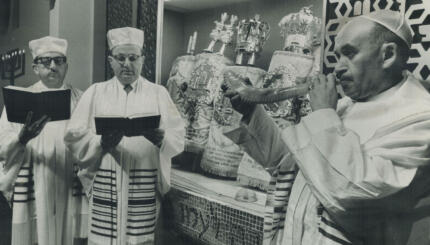There’s an old joke about a rabbi, a priest, and a minister. The three leaders are speaking on a panel at a conference and are all asked the same question: “What would you like people to say about you after you die?” The priest answers first and says he hopes people will talk about how he was able to shepherd his flock and help them understand the love that God has for them as Catholics. The minister then says that he hopes he will be remembered for being a caring and thoughtful man who brought many people closer to Christ. The rabbi answers last; after a pause, she says “I would want people at my funeral to say: ‘look! She’s breathing!’”
Joking aside, the question of what we hope is said about our lives is a fascinating one. Each of us leaves a legacy
—
and the new year is a wonderful time to think about what that will look like.
One of the things that always strikes me about Rosh Hashanah and Yom Kippur is that in some ways the holidays can make us feel like we are starting the new year with a clean slate. But to think like that suggests that our actions and words only have a fleeting impact on others and on the world in which we live. The reality is that all of what we do, i.e. the good and the bad which will ultimately comprise our legacy, is created over our lifetimes and felt for a long time.
In our fast-paced world, many of us don’t have the luxury to reflect on what we do well. Instead, we only find time to dwell on our missteps, often rewinding in our minds those things we regret. But, there’s value in also focusing on where we do well and where we do good. It can help us chart our course for being our best selves moving forward.
A centuries-old tradition that some Jews participate in is writing an ethical will
—
a document that articulates values to pass on to future generations. This is certainly a worthwhile practice. But whether we write such a document or not – all of us can at least take a few minutes to focus on what it is that matters to us: if we were going to write a personal vision statement, what would that look like?
I recently read a graphic novel called
On Purpose
by Vic Strecher. Dr. Strecher points out that having a purpose has many benefits; focusing on something beyond our egos helps us grow, helps makes us more resilient, and can actually help prevent disease. In reading this book I realized that charting our purpose in a forward direction is how we can work to make sure that we ultimately have the legacy we want. To paraphrase psychiatrist Victor Frankl, it’s not just about having the means to live, but having meaning to live.
This blog post is a shortened version of my Yom Kippur sermon which can be viewed here.
Rosh Hashanah
Pronounced: roshe hah-SHAH-nah, also roshe ha-shah-NAH, Origin: Hebrew, the Jewish new year.
Yom Kippur
Pronounced: yohm KIPP-er, also yohm kee-PORE, Origin: Hebrew, The Day of Atonement, the holiest day on the Jewish calendar and, with Rosh Hashanah, one of the High Holidays.



